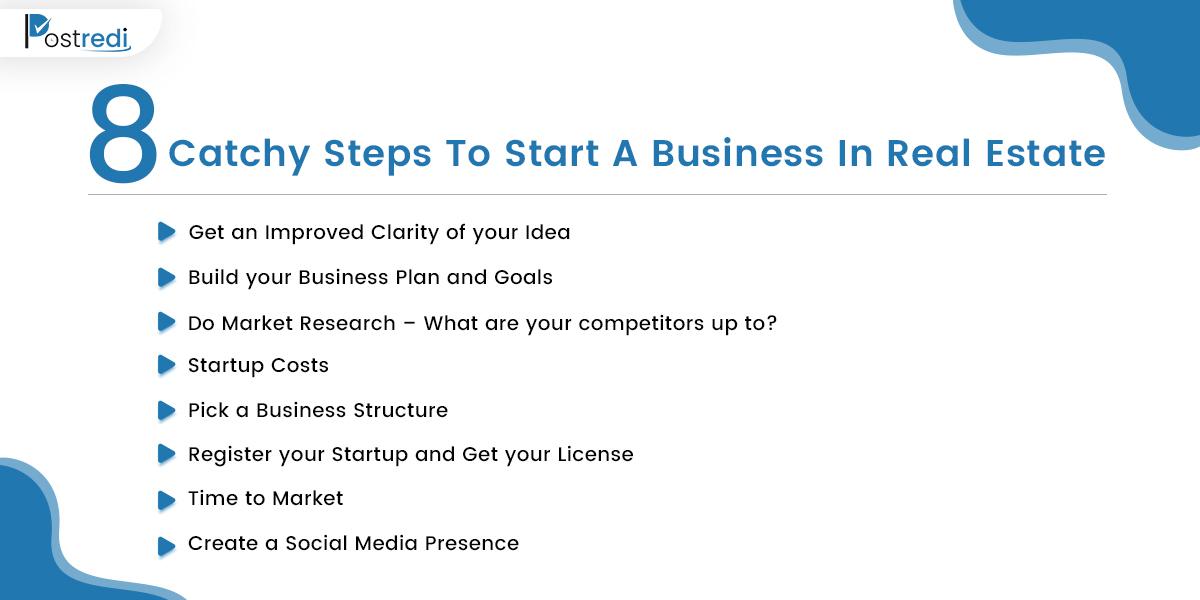One of the businesses, which has been successful through the years is real estate. Why? Because it is always in demand. People will always need new homes and businesses will need commercial areas. Undeniably, it’s time for you to start a business in real estate too. The startup can be confusing, but we are here to help you with it.
What Exactly Is A Real Estate Business?
To start a business in real estate, it is better to know about it first. A real estate business involves buying, selling, managing, and investing in real estate. These real properties can be residential, commercial, agricultural, or industrial.
Real estate has a lot of opportunities from where you can take a start, but you have to invest some proper time into it. The industry is booming with career options and it may as well be your safe ticket to financial security.
8 Catchy Steps To Start A Business In Real Estate

You can start business in real estate by understanding real estate strategy and market strategy. Here are 8 steps that can be beneficial for you while starting business in real estate.
1- Get an Improved Clarity of your Idea
Real estate investment is not a smooth road, there will be a lot of ups and downs, so before you step into this business, it is important to clear your approach. You can be an active investor and manage property directly through renting, rebuffing, fixing, and flipping. Or you can be a passive real estate investor with a hands-off approach in property management. After buying any property, you can just hire a team for its social media management. Ask yourself,
—> Guide on Investment Property Management
It is essential to keep your idea targeted and strategic, and for that, you need to find a niche for your startup.
- Location – Where do you want to start?
- Property Type – Single or multi-family homes, condos, or commercial property?
- Targeted Buyers – Investors, luxury buyers, retail buyers, etc.
The above actors will help you narrow your focus so you can find out your specialty and start completing the following requirements.
2- Build your Business Plan and Goals
Where do you see your business in the next 5 years or so? Figure out your business goals, and financial and personal expectations. They will directly control the investment.
A business plan is an outline of your business’s operational and financial goals. The plan should be focused and short, with every necessary detail. You can find many templates online. A usual business plan has the following parts:
Executive Summary: This session will be written at the end, which will be a summary of all the essential elements of your plan. Anyone who reads this should get clarity about your business ideas immediately.
A company Overview: An overview of your company, what you do, what you will offer to your clients, and who are your target customers.
An Industry Overview: Give a briefing about your industry’s history, trends, players, etc.
Market Analysis: Your target location and which real estate services you will be offering.
Competitive Analysis: Define your indirect and direct competitors and what makes your service unique.
Marketing Plan: What’s different about your selling proposition, what shall be your social media marketing strategy, how will you convince your customer, and so on?
An Operating Plan: About your employees, equipment, facilities, manufacturing process, supplies, etc.
Financial Plan: This will include a balance sheet, a cash flow statement, an income statement, the startup cost, and so on.
Find someone already in the business to help you out with the business plan. They can also be a potential private investor in your business.
3- Do Market Research – What are your competitors up to?
The competition in the real estate market is fierce which is why you will be conducting market research on potential competitors in your targeted area. It’s crucial to know about your market so that you can make a well-informed decision.
- Research potential clients – what do they like? What are the areas of improvement they demand?
- Communicate with potential competitors. Use social media to analyze their strategies.
- Learn about the rental prices/mortgage, home values, etc.
- Look for a mentor to further help you out.
The more detailed your market research goes, the better startup you can build.
4- Startup Costs
You might be worried alit about the capital. Some entrepreneurs start a business in real estate with just $1,000 or less. For the initial step, you don’t even need a fancy office or a lot of employees. You can start with investment in single-family homes. But if you are hooked on starting a proper business, you can raise money with a small loan or Government assistance. Following are some fixed costs:
- Hosting fees and utilities.
- Obtain insurance for your startup and a license.
- Get an LLC (limited liability company) to protect and regulate your business costs.
On-going expenses include:
- Accounting fees
- Taxes.
- Payroll.
- Legal fee.
- Office supplies etc.
You will also have to manage some one-time costs like printer, computer, furniture, software system, etc.
5- Pick a Business Structure
You can select one of the four legal structures for your business startup:
- Partnership – most accessible.
- Sole Proprietorship – most accessible.
- A corporation – needs a setup.
- An LLC – a distinct financial advantage.
Pick a structure that best accommodates your business goals and expansion. After finalizing the structure, you will know where to register.
6- Register your Startup and Get your License
Now that you have planned your finances and business plan, it is time to take the real estate licensing test and get the required licenses for your business. You will need the following legal requirements:
If you will be selling and buying property yourself, get your license.
- Register your selected business structure.
- Open a separate business bank account.
- Secure your employer identification number (EIN) which will be given by IRS.
After obtaining your license, you can gain experience by joining a brokerage firm and building your network of professional contacts. After that, if you plan to start a business in real estate, make sure to protect it through business insurance.
7- Time to Market
Name your business and design a professional logo because it’s time for marketing. This logo is the face of your company and will appear on every promotional material. So make sure it reflects your brand image properly.
Build an online presence by creating a website. It should be easily accessible to your customers so manage to stay at the top results through search engine optimization.
8- Create a Social Media Presence
Not every social media platform is built to best suit your business promotions. Here are three platforms you can work with:
Facebook is a hub of marketing for real estate businesses where you can target your audience and communicate with them easily. Remember to use ads that target a sort of specific audience.
Instagram is the absolute app for your business content. From stories to live sessions and reels, the engagement opportunities are vast. Don’t forget to use hashtags and locations. And here’s a tip, your Instagram shouldn’t be all promotional, add some personality to it.
LinkedIn is a great platform to engage with your fellow realtors. It’s a great place to show off your past experiences or business achievements. You can also set up a company page to keep your customers updated about any new opportunities. Now, what’s left is to make things easier and more efficient for you.
Your Little Helper – Postredi
You have done local marketing, and you have created a central panel for your online customers, you are trying to manage your socials, but still not getting enough leads? you can buy a social media management package or you can hire a person who will write wordy social media posts and manage your social presence. What you need is a social media scheduler. We understand how busy life can be as a realtor and you probably don’t find enough time to post consistently on social media. Consistency is the key here, without time-to-time updates, you will soon end up losing your potential clients. Postredi will help you with:
- Your posts – through its “Generate Post Ideas” tool. All the trendy post ideas are now just a click away.
- Social media management – by posting regularly on multiple platforms and gaining maximum engagement.
- Some me-time – by making a monthly schedule beforehand.
- Leads – follow up on the leads from social media posts on your Postredi account.
Wrapping Up
We have designed a brief guide for you to start a business in real estate successfully. Once you get a license and implement your business plan, there will be a lot of things to handle, which is why Postredi is designed to help you attract the right crowd and the best leads.




















